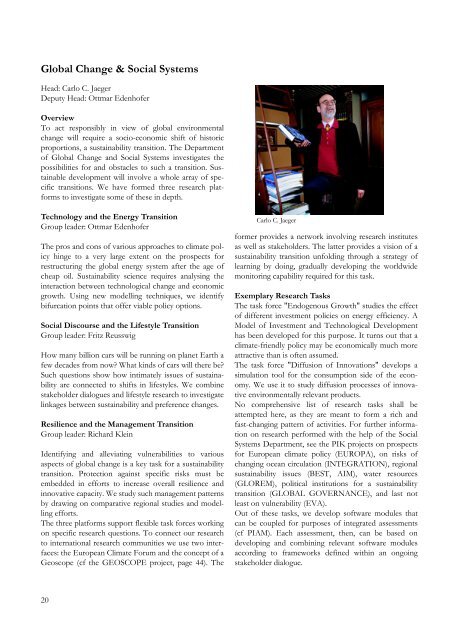PIK Biennial Report 2000-2001 - Potsdam Institute for Climate ...
PIK Biennial Report 2000-2001 - Potsdam Institute for Climate ...
PIK Biennial Report 2000-2001 - Potsdam Institute for Climate ...
You also want an ePaper? Increase the reach of your titles
YUMPU automatically turns print PDFs into web optimized ePapers that Google loves.
Global Change & Social Systems<br />
Head: Carlo C. Jaeger<br />
Deputy Head: Ottmar Edenhofer<br />
Overview<br />
To act responsibly in view of global environmental<br />
change will require a socio-economic shift of historic<br />
proportions, a sustainability transition. The Department<br />
of Global Change and Social Systems investigates the<br />
possibilities <strong>for</strong> and obstacles to such a transition. Sustainable<br />
development will involve a whole array of specific<br />
transitions. We have <strong>for</strong>med three research plat<strong>for</strong>ms<br />
to investigate some of these in depth.<br />
Technology and the Energy Transition<br />
Group leader: Ottmar Edenhofer<br />
The pros and cons of various approaches to climate policy<br />
hinge to a very large extent on the prospects <strong>for</strong><br />
restructuring the global energy system after the age of<br />
cheap oil. Sustainability science requires analysing the<br />
interaction between technological change and economic<br />
growth. Using new modelling techniques, we identify<br />
bifurcation points that offer viable policy options.<br />
Social Discourse and the Lifestyle Transition<br />
Group leader: Fritz Reusswig<br />
How many billion cars will be running on planet Earth a<br />
few decades from now? What kinds of cars will there be?<br />
Such questions show how intimately issues of sustainability<br />
are connected to shifts in lifestyles. We combine<br />
stakeholder dialogues and lifestyle research to investigate<br />
linkages between sustainability and preference changes.<br />
Resilience and the Management Transition<br />
Group leader: Richard Klein<br />
Identifying and alleviating vulnerabilities to various<br />
aspects of global change is a key task <strong>for</strong> a sustainability<br />
transition. Protection against specific risks must be<br />
embedded in ef<strong>for</strong>ts to increase overall resilience and<br />
innovative capacity. We study such management patterns<br />
by drawing on comparative regional studies and modelling<br />
ef<strong>for</strong>ts.<br />
The three plat<strong>for</strong>ms support flexible task <strong>for</strong>ces working<br />
on specific research questions. To connect our research<br />
to international research communities we use two interfaces:<br />
the European <strong>Climate</strong> Forum and the concept of a<br />
Geoscope (cf the GEOSCOPE project, page 44). The<br />
20<br />
Carlo C. Jaeger<br />
<strong>for</strong>mer provides a network involving research institutes<br />
as well as stakeholders. The latter provides a vision of a<br />
sustainability transition unfolding through a strategy of<br />
learning by doing, gradually developing the worldwide<br />
monitoring capability required <strong>for</strong> this task.<br />
Exemplary Research Tasks<br />
The task <strong>for</strong>ce "Endogenous Growth" studies the effect<br />
of different investment policies on energy efficiency. A<br />
Model of Investment and Technological Development<br />
has been developed <strong>for</strong> this purpose. It turns out that a<br />
climate-friendly policy may be economically much more<br />
attractive than is often assumed.<br />
The task <strong>for</strong>ce "Diffusion of Innovations" develops a<br />
simulation tool <strong>for</strong> the consumption side of the economy.<br />
We use it to study diffusion processes of innovative<br />
environmentally relevant products.<br />
No comprehensive list of research tasks shall be<br />
attempted here, as they are meant to <strong>for</strong>m a rich and<br />
fast-changing pattern of activities. For further in<strong>for</strong>mation<br />
on research per<strong>for</strong>med with the help of the Social<br />
Systems Department, see the <strong>PIK</strong> projects on prospects<br />
<strong>for</strong> European climate policy (EUROPA), on risks of<br />
changing ocean circulation (INTEGRATION), regional<br />
sustainability issues (BEST, AIM), water resources<br />
(GLOREM), political institutions <strong>for</strong> a sustainability<br />
transition (GLOBAL GOVERNANCE), and last not<br />
least on vulnerability (EVA).<br />
Out of these tasks, we develop software modules that<br />
can be coupled <strong>for</strong> purposes of integrated assessments<br />
(cf PIAM). Each assessment, then, can be based on<br />
developing and combining relevant software modules<br />
according to frameworks defined within an ongoing<br />
stakeholder dialogue.

















